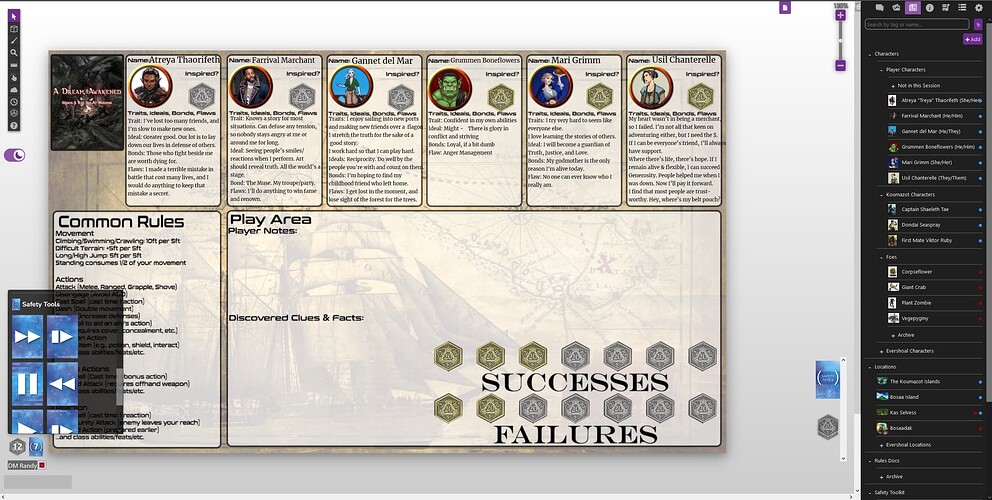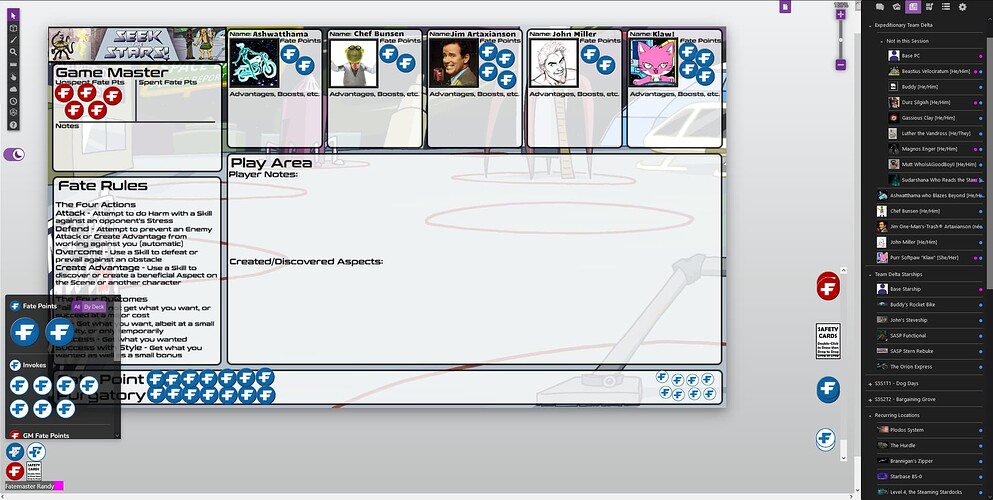Also @Nightgaunt, if you have followed any of the Ironsworn/Starforged conversations around here, that system is also PbtA, you can get an idea of how the general concept of ‘moves’ plays (from a solo perspective at least) from this thread:
Has anyone had any experience with Foundry Virtual Table Top?
Yes, especially last year (which brings it into the purview of the 2022 TTRPG thread). Basically, it’s the best VTT that I’ve played with. It’s also another hobby on top of the game you want to play, figuring out what the right hosting situation is for you. Do you pay Forge to host your Foundry game or muck around with port forwarding? How many optional modules do you need to truly get your game experience right, or at least good enough? How much do you want to spend on Patreons paid to other Foundry fans who have worked out solutions to some underlying problems?
A buddy of mine used Foundry for his 5e Strahd campaign and Numenera campaign. Both were well run, fun, and stable. I was glad to be a player. (I remember the QT3 D&D 4e Fantasy Grounds campaign; that platform was better than playing over the phone lines on conference call but it crashed frequently.) I tried running one session of my long-running 5e game on Foundry. (We tried it because of the pandemic shutdown.) It was so traumatic that we haven’t played since, even back to the in-person tabletop. I also tried messing around with the '80s Ghostbusters RPG and can’t figure out how to get the Ghost Die to roll.
In short, if you’re determined and have lots of resources, be it cash, time and/or know-how, it’s a wonderful tool. There’s room for improvement but as a player with a good DM/IT support, it’s terrific. I prefer it over Roll20 and Fantasy Grounds.
Well, the Humble Bundle came with the Abomination Vaults Module and a lot people on the 2e reddit really seemed to like it for pathfinder.
I love Foundry. Feels a little like the Linux of VTTs. It’s really powerful and works really well, but you need to dig into it a little bit to use it. But I’ve both run and played in a number of foundry games and highly recommend it. I’ll echo Djscman’s preferring it to Roll20 and Fantasy Grounds, for me by quite a decent amount.
Roll20 is a very poorly made hammer that has now been marketed as a screwdriver, wrench, and banana-hanging stand. Which is to say, the majority of its core assumptions/base systems presuppose D&D as the only thing you’d ever imagine playing. Those systems/assumptions largely haven’t changed much since its earliest days; they’ve just been piling bandaids and extras on top of them for years now. My experience with it is that it’s buggy, slow, prone to extremely weird behaviors and edge cases, and filled to the brim with poorly documented but extremely useful features and options. People have been beating that rickety scaffolding into sort of supporting myriad other systems for years and years, morphing d20-centric toolsets and UI elements into things at least marginally suited for other systems, but it always feels a little like a hack to me, and getting it rolling well as a GM is deeply frustrating, time-consuming, and requires a shitload of Roll20-specific extra work on your part.
So, amusing then that every experience I’ve had or heard about with Foundry makes me less interested in replacing Roll20 with it, lol.
“The Linux of VTTs” is an extremely apt comparison, but when I use it, it’s intended as a nigh-unspeakable insult/divine condemnation/absolute repudiation :D
I am not even sure what a VTT designed for playing the things I would play looks like because I don’t know how much you need a VTT for like, PBTA.
Having received a number of things for Role, maybe it’s that? I dunno, I didn’t back those particular things expecting to play them, mostly.
PBTA-style games are more my jam, and Roll20 modules were okay in terms of giving us pretty, shared, interactive character sheets that updated the right values and logged dice rolls to chat. But the A/V experience and general bugginess was always a struggle.
My preference is still Zoom/Hangouts video chat with Google Sheets for narrative games, and the jaw-dropping Owlbear Rodeo for quick dungeon games.
Well, that’s just great! I hadn’t even heard of Owlbear Rodeo, and now there’s another simple VTT to check out?
I remain pretty pleased with the Roll20 “playmats” I designed off of some long-lost reddit guide, which are very solid for theater of the mind type stuff but awful for tactical combat, of course. Still, I use 'em for a lot of the D&D stuff I’m running right now up until we drop into battle. Collecting handy things like PC descriptors (traits/bonds/flaws/ideals) for inspiration triggers is nice, and I’ve made a few basic little trackers for things like Skill Challenges.
Works a little better for less-fiddly things like Fate, though not being able to squeeze in PC aspects is a real bummer; I gotta keep a separate sheet open to the side.
Players can use the text tool to add notes and such, and I can still drag-drop tokens onto the area to show foes when they show up; I mostly use Handouts for location info.
We generally use Jitsi, Zoom, etc., for video/voice, though; Roll20’s built in stuff is hot garbage. The little customizable decks for things like Fate Points, safety cards, etc., are neat, but again, very much a “this kludge kind of accomplishes what you want so just go with it” type thing.
Alchemy VTT seems like it’s meant for more theater of the mind with heavy emphasis on creating atmosphere. Not sure if it’s actually all that simple to use but it definitely puts presentation at the front and center. Its current kickstarter has unlocked enough stretch goals to include a number of different systems (heavy on Free League so far).
Yeah, but there’s a ton of Roll20 that’s completely vestigial in that sort of play. starting with the map screen. Because it’s designed for playing D&D, and has a lot of stuff that’s cool (if a lot to learn and possibly janky - I’ve only seen any of it in the actual plays they’ve done for their youtube) for that. For Apocalypse World or whatever it just feels like all you really need is a spot to stick sheets, chat, and a dice roller, and while Roll20 certainly does those things, it’s cluttered and another account and there’s ads and…
But maybe a VTT that focuses on that sort of thing could bring more to the table in a way Roll20 doesn’t really, IMO. I just don’t know what.
I love Foundry. Currently running Savage Pathfinder Rise of the Runelords. It’s fantastic for games that rely on battle maps. Role is the one I go to for light/indie games as the sheets are easy to create yourself and it has a focus on Video that I like. Their map support is crap though.
Foundry is awesome - its also somewhat taxing on machines, which is something to keep in mind.
I’ve kickstarted the abovementioned Alchemy VTT, which seems quite well done in terms of UI and presentation, something which Forge lacks a bit. Forge is great, but it has a definite learning curve.
Going with the linux thing where that’s how I think of Foundry, Alchemy feels like the OS X of the group. If you can work with how it does things, it seems to provide a beautiful presentation that’s clean. I tried entering some homebrew non-supported stuff and I got jammed up. But the kickstarter has me excited for how many rulesets it has with properly designed support (hopefully).
Fantasy Grounds is the IBM OS/2 of VTTs.
Now I want to try it.
Definitely go for it. I kind of dig it in a way when there’s a system natively supported for it.
So, what do I need to keep it simple?
Foundry + The Forge is THE way to go. No stupid DIY problems, let someone ELSE host it with a dedicated server and send your players an easy logon and stay out of TCP/IP land.
It is also excellent for those not interested in playing the game published by the Pinkertons WOTC. Supports a whole lot more than 5e or One or whatever its called. Cthulhu, Traveller, Pathfinder, GURPS, you name it. Seamlessly. And a lot less trying or nitnoiding for the GM than Roll20 @ArmandoPenblade
I switched a year ago, and have several players/GMs used to roll 20 and all agree it is easier, smoother, and has less inherent chunkiness than the stuck in 2015 Roll20. Also no “its saturday ad this thing is sluggish” bc every nerd in the world is trying to rollem dice on Roll20.
Costs money, but in life, you get what you pay for. I just prefer not paying for the dreck I got from Roll20.

